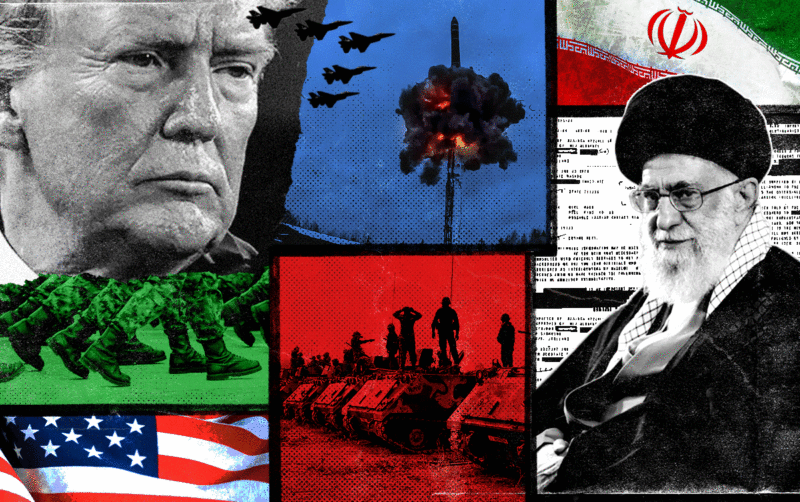Editorial
As WW3 Fears Rise, Here’s How to Stay Grounded
Over the weekend, global tensions took a sharp and dangerous turn.
The United States launched a major airstrike—“Operation Midnight Hammer”—targeting Iranian nuclear facilities in Fordow, Natanz, and Isfahan. Within hours, Iran responded by launching missiles at a U.S. base in Qatar. Fortunately, no casualties were reported. But the alarms went off around the world.
Almost instantly, “WW3” started trending. Google searches for “draft age” skyrocketed. And already record-high levels of Islamophobia were exacerbated.
Fear is understandable. War is terrifying. But what we do with our fear—the stories we tell, the language we use, the assumptions we make—matters just as much as what happens next.
Whether you support U.S. involvement or not, in these times of heightened fear, we must be extra careful to avoid dehumanizing “us vs. them” mindsets (between left and right, or between Americans and Iranians) and misinformation designed to stoke those divisions. War often escalates when we give in to both.
Here’s how we can all help turn down the temperature.
Fear Fuels Division—Unless We Stop It
Fear makes us tribal. It narrows our perspective, splits the world into “us” and “them,” and convinces us that those who disagree are dangerous.
In times of crisis, this thinking gets even more seductive. Some retreat into partisan corners, blaming the other side of the aisle. Others embrace a more global version of “us vs. them,” demonizing entire populations rather than the decisions of governments. It’s easy to forget that many Iranians, like many Americans, have no say in military operations and want nothing to do with this conflict.
This dehumanizing mindset isn’t new—it’s the prelude to every war we’ve ever fought. When we reduce people to caricatures or enemies, violence becomes easier to justify.
That’s why now is the time to resist it. Talk to people you disagree with—yes, even now. Not to win, but to understand. Empathy is not a luxury in moments like this. It’s a necessity.
Misinformation Loves a Crisis
In the first hours of any major event, facts are scarce and noise is abundant. Misinformation fills the void before facts can catch up—and social media makes it worse.
You’ve probably seen out-of-context videos claiming to show the bombings. Or dramatic headlines announcing things that didn’t happen. Or viral posts that are more ragebait than reporting.
In a fog-of-war news cycle, ask more than “Is this true?” Ask: Is this helping?
Before you post, pause. Share information from reliable sources, not just opinions. And when you correct someone else, do it with grace. Shaming doesn’t change minds—compassion might.
Sensationalism may drive clicks, but clarity saves lives. Let’s choose the latter.
Our Words Matter—More Than We Think
There’s a kind of language that creeps in during global conflicts—language that strips away humanity.
“They only understand force.”
“They’re animals.”
“Wipe them out.”
We’ve heard it before. It sounds strong, maybe even justified in the heat of the moment. But it’s not strength. It’s surrender. It’s giving in to fear and rage instead of thinking clearly and acting wisely.
This kind of rhetoric doesn’t just appear in comment sections—it’s on TV, in political speeches, and often, in our own conversations. And it keeps the cycle going.
When you talk about what’s happening, speak as if people are listening—because they are. Speak with care. Most Iranian civilians are not our enemies. Most Americans aren’t either. Let’s not forget that.
What We Can Control
No one reading this is sitting at the Pentagon with their finger on the strike button. But all of us have influence—on our families, our communities, our feeds, and our conversations.
The path to war is paved with fear, division, dehumanization, and disinformation. If that’s what takes us there, then the opposite—curiosity, connection, clarity, and courage—is what brings us back.
You can help.
Stay grounded. Stay informed. Talk to people, not at them. Seek truth over outrage. When fear tempts you to divide, be the person who reaches out.
Because in moments like this, staying human is one of the most patriotic things we can do.
When fear feels large enough, we start justifying our division. Instead of giving in, let’s do what we wish our leaders did before hurling bombs at each other—let’s sit down and talk.
—Alex Buscemi (abuscemi@buildersmovement.org)
We’re a nonprofit, nonpartisan organization on a mission to overcome our most toxic divides.
Sign up for our FREE weekly newsletter.
Keep Reading

Bias Watch: Is Trump Bringing Back Asbestos?

As WW3 Fears Rise, Here’s How to Stay Grounded
